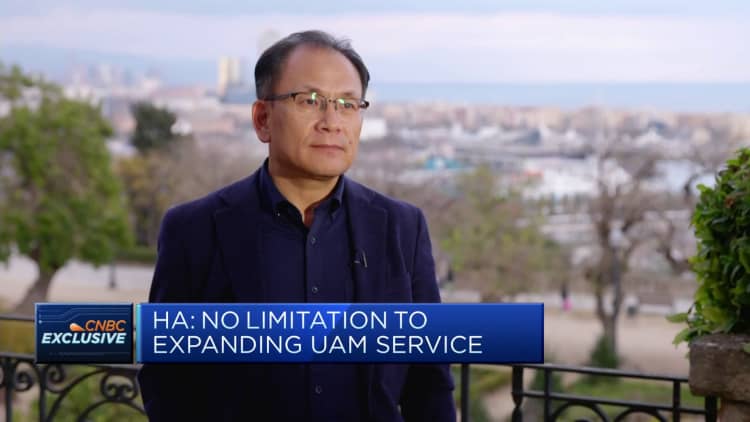A South Korean telecoms giant wants to launch flying taxis in 2025 and expects it to be big business

BARCELONA, Spain — South Korean telecommunications giant SK Telecom is planning to launch a flying taxi service in 2025 and expects it to generate “significant” revenue going forward, a senior executive told CNBC.
Last year, SK Telecom and U.S. firm Joby Aviation inked a tie-up to develop air taxis for the South Korean market. Joby Aviation is a maker of so-called electric vertical take-off and landing vehicles. These electric flying vehicles are a seen by advocates as a way to transport people around dense cities and avoid traffic.
The South Korean government is pushing forward with trying to commercialize air taxis by 2025.
SK Telecom and Joby Aviation are looking to take advantage of the government backing. Ha Min-yong, chief development officer of SK Telecom, told CNBC in an interview Sunday that the company’s air taxi service will be made available commercially “sometime in the middle of 2025,” before expanding to other areas like logistics.
“So by 2025, if we are able to prove that the service quality is acceptable to the general public with the safety and also security, then they [the government] will allow the operator to expand the area of the service, including logistics and tourism as well as medical-related services,” Ha told CNBC at the Mobile World Congress event in Barcelona, Spain.
SK Telecom is looking to expand its business beyond being a traditional mobile carrier and has its sights set on new areas such as artificial intelligence and flying taxis. These aircraft will require connecting to next-generation 5G networks to operate and fly, eventually autonomously. That’s where SK Telecom’s area of expertise comes in.
SK Telecom has partnered with U.S. firm Joby Aviation to bring flying taxis to South Korea in 2025. SK Telecom is looking to diversify its business model to new areas including urban air mobility and artificial intelligence.
Arjun Kharpal | CNBC
While this form of transport is at an early stage, consultancy Roland Berger forecasts that there will be nearly 160,000 unpiloted electrical drones in use worldwide by 2050. They will generate an annual revenue of nearly $90 billion, the company says.
SK Telecom wants a slice of the pie and Ha said that if all goes well, air taxis could be a big revenue driver for the company, “but not immediately.”
“So for the next at least five [to] seven years, we need to make sure that the service that we are going to offer to, you know, society and community is safe enough,” Ha said.
“Once it’s accepted very well by the community and society, then we believe that it will generate a significant amount of revenue.”
For all the latest World News Click Here
For the latest news and updates, follow us on Google News.

